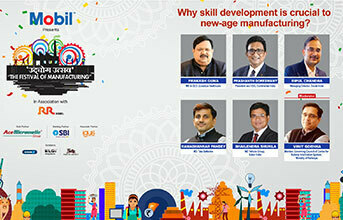
Manufacturing is one of the crucial industry sectors in India. The potential for employment in this sector is immense with new-age, digital technologies disrupting the industry. Training candidates in evolving technologies has become mandatory to cater to the requirements of the skilled workforce in this sector.
Answering the question of how the new-edge technologies have been adapted in the manufacturing sector, Prashanth Doreswamy, President and CEO, Continental India said, "To understand why skill development is required in the new edge of manufacturing we need to understand what kind of transformations are happening which is important for the success of today, and tomorrow as well."
Doreswamy lists down six proprieties - Industry 4.0, demand for quality and efficiency, new technologies and trends, increased focus on sustainability, Make in India and lastly, gender parity. He further said, "Unfortunately, within manufacturing, I think the involvement of female workers is less than 17 per cent."
Taking the discussion further, Shailendra Shukla, MD Vehicle Group, Eaton India questions why there is a need for new-edge technology. He further explains, "We need safety, faster productivity, quality, and efficient delivery, and then there is a cost. According to Shukla, the new-edge manufacturing will be driven by sustainability energy and digitisation. And I believe that our workforce needs to be upskilled or reskilled.
Vinit Goenka, who was moderating the session, talked about the importance of gender diversity in the manufacturing sector. During the discussion, he mentioned the Pradhan Mantri Kaushal Vikas Yojna which retained around 1.37 crore workforce and asked the panellist should the training institutions update their curriculum to align it better with evolving technologies. Is a degree more important than a skill? To this, Suman Yadav, Vice President - Operations, Hindware said, "The demand and skillset for the manufacturing industry s changing now. The onus is just not on the institution, but also on the industry at large, to collaborate with such institutes and develop an ecosystem."
At present, he further explains, the manufacturing companies set up training centres where they train people to get a first-hand experience in their process knowledge. What eventually these manufacturing companies are doing is inside their establishments. "I think, this needs to change and manufacturing establishments should extend support to institutes in building a curriculum in line with present changes."
Ramashankar Pandey, MD, Tata Batteries feels that we, as Indians, are highly obsessed with degree and designation. "So in our country, the designation moves with an understanding that he/she is skilled or not. In our country, at least any mother who wants to marry her girlchild to somebody called a master plumber or the chief technician is very less or negligible. This is because society does not recognise the skill, and gives more impetus to the reputation which comes with designation."
Meanwhile, Prakash Guha, MD & CEO, Zuventus Healthcare explains to the audience that pharma manufacturing is different because pharma is a knowledge-based industry and requires a certain set of skills. He said, "Pharma industry has already adopted new-edge technologies such as digitisation and robotics. We are also contemplating bringing AI to manufacturing. But all these activities are driven by skilled manpower because the pharma industry is run by the regulators."
During the discussion, Bipul Chandra, Managing Director, Ducati India believed that the problem areas in the manufacturing industry are quantifiable, like sales. There is always a reverse process. Increasing the skill level also means giving them (shopfloor workers) ownership of the entire process along with an honest opinion of what the market is thinking about the product. Because, he said, "At the end of the day, what you do in the factory (end product), which is purchased by customers may come back (with defect) and haunt us in the future."



























